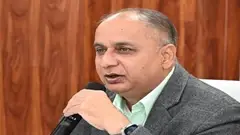In the fast-paced development of the agricultural sector, hindrances like fake seeds and pesticides affect the industry at all tiers, especially farmers. Dealing with this problem has been taking a toll on the sector and associated stakeholders. Industry experts Ankit Gupta, Member of ASPA Governing Body and Dr. Raju Kapoor, FMC Corporation, speaks to Stuti Das of Krishi Jagran on the auspicious day of Kisan Diwas on tackling the rampant problem of fake seeds and pesticides in the market.

Ankit Gupta, Member of ASPA Governing Body and Director of Holostik India shared his remarks on the enraging issue of fake seeds and pesticides and ways to confront it.
How does illicit seed and pesticide affect the livelihood of farmers around the country?
A FICCI report states that one-third of pesticides in India are fake. The case is the same with seeds, fertilizers and other agro products. Such counterfeit products result in poor crop production, loss of profits, and deteriorated soil quality for farmers. The already burdened farmers often resort to suicide which have been reported across the country time and again.
With the concerns of fraudulent products circulating in the market, awareness becomes an important instrument for stakeholders. What have been/could be some steps towards spreading awareness, especially keeping the grassroots in the center of it?
Yes, awareness plays a vital role in fighting fake. A study reveals that only 25-30% of farmers are aware of the right usage of pesticides. Most of them overlook the important details mentioned on the packaging making them susceptible to cheap copies.
Creating awareness among the farmers should be a joint effort of the Government & the Agro companies. We would urge the government agencies to increase the awareness about the issue and impact of counterfeit pesticides, seeds and fertilizers to the farmers, society, economy and environment.
Agro companies must utilize anti-counterfeit security packaging to deter fraudsters. They should also highlight instructions (in regional languages) on their packaging to differentiate between fake & genuine products. Likewise, the companies must also initiate advertising campaigns to instruct consumers on how to identify security features in the packaging and authenticate a product.
Also, imparting convenient product authentication mechanisms for farmers & retailers in far flung villages is a must. A poor farmer must have the choice to digitally verify a product’s genuineness with a SMS code in case his/her device doesn’t support the internet.
What stands as a major challenge in regulating and overcoming the illegal seed and pesticide chains and how would your organization be instrumental in easing it?
Agri supply chain in India is complex and fragmented. Till date, most of the transactions remain physical with little scope for digitization. The traditional supply chain also bears the brunt of counterfeiters, poor regulations & opportunity seeking brokers who dupe the farmers. Secondly, National anti-counterfeit activities tend to focus on high-profile sectors where the VAT losses are largest (Alcohol, Tobacco, Luxury goods, software, pharmaceuticals). Less high-profile sectors like farmers do not get the requisite resources– despite the acute environmental and health threats posed by counterfeit pesticides.
ASPA has always been vocal about the rise of counterfeiting in the Agri industry. We believe technology and digitization can address this concern. Printed QR codes on product packaging enabled with tracking and traceability software can help supply chain stakeholders to determine a product’s authenticity.
This will weed out counterfeits, monitor inventory and allow timely delivery. However, to stay ahead of counterfeiters we suggest that Agro companies must incorporate 'Phygital' (Physical + Digital) technologies. This multi security approach will keep even the smartest criminals at bay.
Besides guiding the industry on using the latest technology against counterfeiting, ASPA raises nationwide awareness against counterfeiting & regularly publishes market intelligence reports on fake products, its economic impact, and ways to counter it. We welcomed the recent announcement by Central Union and State regulatory bodies towards authentication and traceability of agriproducts. Recently, Telangana implemented the seed traceability system, while Jharkhand envisioned to implement blockchain technology for tracking the distribution of seeds, inputs, implements.
What are some methods of screening the authenticity of products that can prevent the illicit products from entering the market?
One way everyone can prevent falsified products from entering their supply chain is to put in place a robust authentication and traceability mechanism. Today, product authentication technology ranges from physical security to digital technologies. Physical security features like hologram, tamper evident label, security label, security seals, security inks help supply chain stakeholders to screen fake products. Digital technology security encompasses product authentication, track & trace and much more that can be combined with physical security to upgrade the screening process. The proven adoption of these technologies by countries like Tanzania and Uganda can be treated as case studies.
Keeping an ideal future in mind, transformation is a dominant factor; what would the ideal agricultural scenario of India look like if this problem is resolved? Please briefly explain the socio-economic transformation of farmers.
Digitization of the Agri supply chain will bring a revolutionary change. The end-to-end tracking & traceability will ensure genuineness of products and help manage inventory. Digitally empowered farmers will also be able to gain benefits from consumer loyalty programs and schemes. Moreover, Agro companies will save a huge amount of money lost to fake products.
The agriculture sector is one of the most important contributors to the Indian economy & farmers are its backbone. A transparent supply chain will improve the crop yields, drive profits, provide market access, ensure better price realization, and provide access to valuable farm management data. A digitally empowered farming community can always take better decisions.

Dr. Raju Kapoor, Director Public & Industry Affair, FMC gives his valuable insights on the concerns related to illicit seeds and pesticides circulating in the market.
How does illicit seed and pesticide affect the livelihood of farmers around the country?
Since farming is a high risk venture and Indian farmers have rather low levels of adversity tolerance, the farmer can lose out not only on his crop but his / her entire investments that went into the field before a non-genuine product usage leads to the crop failure. Most of the time farmers take loans to buy such inputs and when these inputs fail the farmers , it breaks the farmer’s back and it becomes very difficult for him to recover back. It causes a long term dent in farmers’ viability.
With the concerns of fraudulent products circulating in the market, awareness becomes an important instrument for stakeholders. What have been/could be some steps towards spreading awareness, especially keeping the grassroots in the center of it?
Innocent farmers are the most impacted lot due to the problem of counterfeits. An awareness campaign among the farmers on ‘good buying’ practices is crucial. For example, compulsory purchasing agri- inputs only against an invoice, buying from a reputed and licensed dealer, not succumbing to the lure of low price offers are some of the areas which must be repeatedly communicated to the farmers. This awareness campaign must be a partnership effort between the public and the private system.
What stands as a major challenge in regulating and overcoming the illegal seed and pesticide chains and how would your organization be instrumental in easing it?
The major challenges in regulating and controlling can be classified as:
Technological: newer anti-counterfeit technology (on packaging) must be embraced and promoted by the genuine industry. We must leverage the reach of mobile telephony and internet at the village level for providing farmers the power to verify the genuineness of the product they intend to purchase.
Administrative and Legal: Strict control over issuing the ‘Me-Too’ registrations only to the genuine applicants, stringent quality testing at the grass root levels, transparent and uncompromisable sampling and testing, building up the quality testing infrastructure and manpower resources, quick trial and assured prosecution would be some of the important initiatives
Awareness and Communication: FMC has been upgrading its ACF technology over the years. It deploys resources to track and trace the misbranded products and their manufacturers, works with the industry to ensure farmers have access to genuine products and takes legal action against those whom it can catch.
What are some methods of screening the authenticity of products that can prevent the illicit products from entering the market?
Technology offers multiple options today that consumers can use to screen the authenticity of the product to intend to buy. These range from biotechnological markers to on label screen authentication solutions etc.
Keeping an ideal future in mind, transformation is a dominant factor; what would the ideal agricultural scenario of India look like if this problem is resolved? Please briefly explain the socio-economic transformation of farmers.
The natural outcome of control on the counterfeits and counterfeiters would directly add to the farmers’ productivity and income increase. Since Indian farmers are largely small and medium farmers , they have very low resilience if they suffer crop failure due to the counterfeit inputs – seeds or pesticides. Since many of these farmers are under debt, a single crop failure takes them down drastically. Many times, farmers are forced to adopt the most extreme steps, when faced with this adversity. Not only the farming community but even the government exchequer also tends to lose heavily due to illicit products and manufacturers as they bypass the formal trade channels.

















Share your comments